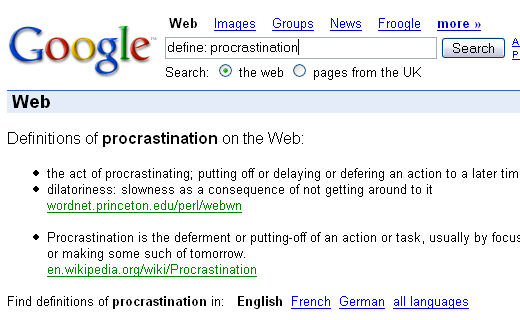Believe it or not, action shelving is a technique you’re definitely familiar with. You may have used it only a few times and even then did it unconsciously, but you should recognize the concept once I explain it in more details.
Cherish your concentration
In anything you do, your success heavily depends on how focused and concentrated you are. It takes a lot of effort on your part to maintain the focus while processing pages and tables of information, and you probably know yourself the frustration you experience when suddenly distracted or interrupted in the middle of such a task. You grow frustrated because you know it will take you some time to get back into the focused state.
It is important to realise though, that concentration isn’t simply a state of mind and a result of your interest in the subject, but it is also your ability to isolate the task you’re working on from all the rest. Concentration is getting into a state where you pay attention only to things important for accomplishing a given task.
Just think about it: when you’re trying to concentrate on something, what do you experience? Usually you keep thinking about the subject and focusing on the task until all the other things and subjects around you and in your mind start slowly fading away. And when the right balance is reached and your brain finally finds the level of background thinking noise acceptably low, you see and feel yourself fit for the process – you feel focused and concentrated on just the task you need to be working on, you feel organized and motivated.
Get rid of distractions
The more productive you become in any aspect of your life, the more you will notice that there is a direct correlation between your levels of commitment and focus on a task and how successfull your accomplishments are. And ultimately this brings you to realising once again how vital it is to get rid of distractions before approaching any given task.
For example, do you find it much easier to work when your workplace is nice and tidy? When you have only the essential tools on your desk, and none of your post-it notes or books or pencils scattered all over it?
This is because by tidying your desk you’re effectively getting rid of distractions. You’re physically removing all the things which can distract you even by accident, and by doing this you’re limiting your concentration options to only subjects you’ll be working on.
I have worked out a habit of tidying my workplace every week. It happens so naturally and quickly, that I really don’t mind doing it. Instead, every time I do it, I just feel how much easier it makes any task I will be working on, how much clearer my vision of the positive outcome will be, and all this motivates me a lot.
Action shelving: remove the complexity
Do you ever think about why we like using shelves for storing things? We have many reasons for doing so, but among the most obvious and important ones are:
- organizing books
- making sure everything is within your reach
- making information easy and quick to find
The same principles work in many other areas, including the one I’m talking about right now.
Action shelving is how I call an organizing approach which makes sure you split any activity or complex task of yours into flat levels of simple and easy to follow steps. Action shelving ensures that no action on your list has any unknown implementation steps.
The idea is really simple: it is in human nature to be afraid of anything unknown. Although it is possible to train yourself overcome such fears and even work out a positive approach to everything unknown, it requires a lot of effort on your part and there is no way to guarantee the positive outcome in such a training.
With complex projects, the fear of unknown implementation steps slows you down. You may not necessarily notice it, but unknown things in your plan affect the way you think about the project and the way you plan tackling it. As long as there is at least one absolutely unknown step in your plan, any task will seem much bigger than it really is.
Just remember now, how often did you have tasks which seemed scarily complicated at the beginning, and then somehow turned out to be ridiculously trivial to accomplish? This is simply because some elements of these tasks were unknown to you at the beginning of the project, and slowed you down. Once you had progressed enough with other steps of the task to learn more details about the unknown part, you realised how simple this part is, and quickly got it sorted.
Action shelving is thus a proactive approach of asking necessary questions about various parts of any complex task to ensure the simplicity of every step you put down on your implementation plan.
You should apply action shelving few times during any project: right at the very beginning, to ensure a quick and powerful start; somewhere in the middle of the project, to ensure you’re still moving in the right direction and to also get a clear vision of what your next actions should be; and at the very end of implementing a project – to effectively build a flat and easy-to-follow structure of the outcomes and goals of the project. Not only will this help you concentrate better on each of the goals, but it will also make it easier to see when you reach a particular goal.

